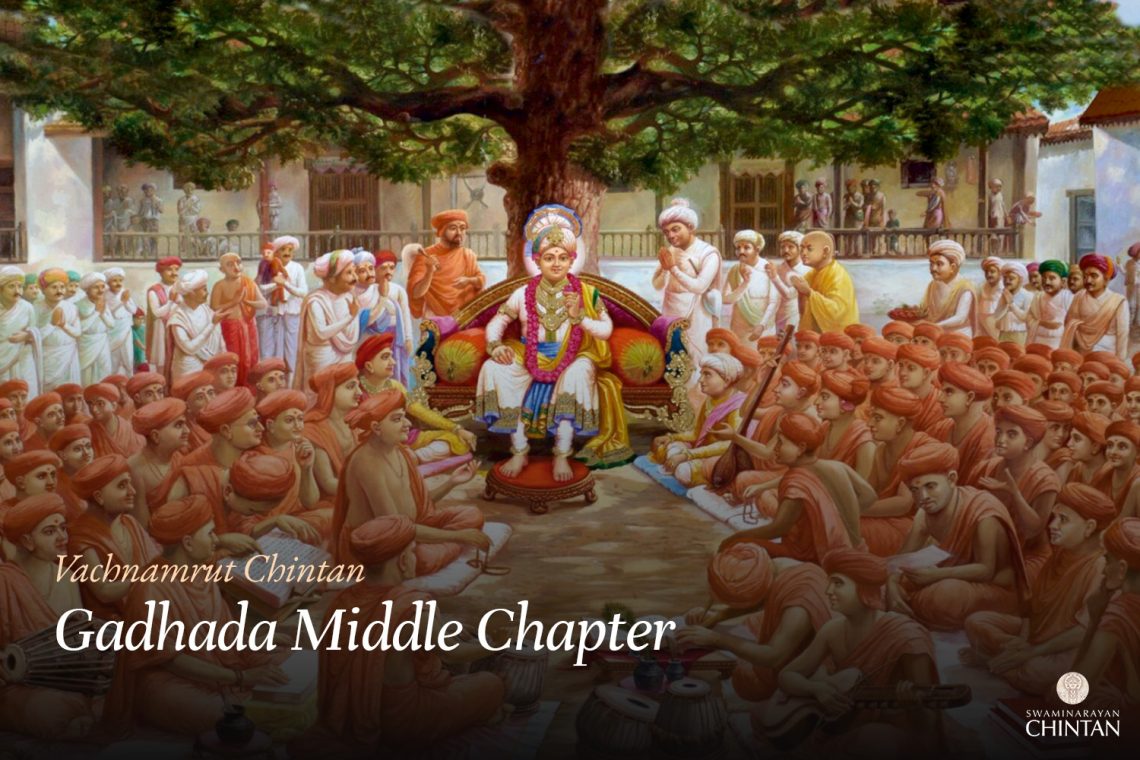Central Insights:
- How to overcome one’s Prakṛuti (natural tendencies).
Key Points:
- To overcome Prakruti, one needs Vishvas (faith), Preeti (affection), Garaj (urgency), and Dheeraj (patience) towards a Satpurush.
Explanation:
This Vachanamrut addresses the challenge of overcoming one’s Swabhav (natural tendencies). Maharaj refers to a verse from the Bhagavad Gita:
सदृशं चेष्टते स्वस्याः प्रकृतेर्ज्ञानवानपि ।
प्रकृतिं यान्ति भूतानि निग्रहः किं करिष्यति ॥
sadrusham cheṣṭate svasyāḥ prakṛuter jñānavān api;
prakṛitim yānti bhūtāni nigrahaḥ kiṁ kariṣhyati.
(Bhagavad Gita 3.33)
Even a Gnani (man of knowledge) acts according to his Prakruti. The restraint prescribed by the scriptures proves ineffective because Prakruti is deeply ingrained in the soul. Even if the soul leaves the body, the Swabhav does not easily depart. Despite knowing the prohibitions of the scriptures and being wise, when opportunities for favorable material gains arise, one’s Prakruti takes over, rendering scriptural prohibitions ineffective.
Thus, overcoming Prakruti is quite difficult. How can one get rid of this ingrained Swabhav? When the Santo could not provide a satisfactory answer, Shreeji Maharaj himself responded.
Shreeji Maharaj explained that one who sincerely wishes to renounce their stubborn Prakruti must have Atishay Vishvas (immense faith) in the words of a Satpurush, and must develop Atishay Preeti (immense love) towards such a person. Even if that person speaks harsh words that cause pain, one should view them as beneficial. Without this unwavering faith and love towards the Satpurush, there is no other way to overcome one’s Prakruti.
In Vach.G.L.24, Shreeji Maharaj mentions that Prakruti is overcome by Swarth (self-interest). For example, Dada Khachar and his family maintain favorable behavior towards me because they have a vested interest in me. This type of Swarth helps them to overcome their Prakruti. If, however, the Swarth is worldly, one’s Prakruti will return once their interest is fulfilled. But if the Swarth is focused on spiritual welfare (alaukik-kalyan), then, unlike worldly Swarth, it does not have an expiration and becomes a spiritual practice, leading to the complete annihilation of Prakruti.
Maharaj concluded that to overcome Prakruti, one must have Vishvas in the guide. One must believe firmly that through their guidance, spiritual welfare will certainly be achieved.
The second point Maharaj made is that one must have Preeti (affection) towards the one who provides the guidance. Neither Gnan (knowledge) nor Vairagya (detachment) are as effective in overcoming Prakruti as Preeti is. Out of love, one voluntarily surrenders their Prakruti without needing instructions. This can be observed even in worldly affairs, and the same principle applies on the path of Moksha (liberation). The first sign of genuine Preeti is abandoning one’s own Prakruti and adopting the Prakruti of the one they love.
Maharaj states in Vach. Vadtal 11 that a soul cannot fully recognize the glory of a Satpurush. Without recognizing this glory, one cannot attain spiritual stability, and without spiritual stability, the glory remains unperceived. To overcome this circular obstacle, Maharaj suggests developing affection towards a Satpurush just as one would for a family member. Such affection becomes a surefire remedy for overcoming Prakruti.
The third requirement is Dheeraj (patience). Even with faith and love towards a Satpurush, one’s Prakruti does not disappear immediately. It requires endurance. Maharaj explains that even if harsh words are spoken, one must view them as beneficial and continue with patience. Only then will Prakruti be overcome.
Glossary
| Prakruti – Natural tendencies or inherent nature |
| Swabhav – Nature |
| Vishvas – Faith Unshakable belief in the words and guidance of a Satpurush or Bhagwan. |
| Preeti – Affection Deep love and emotional attachment to Bhagwan or a Satpurush, aiding spiritual progress. |
| Dheeraj – Patience The ability to endure challenges and obstacles while remaining steady on the spiritual path. |
| Satpurush – A true saint or spiritual guide |
| Atishay Vishvas – Immense faith |
| Atishay Preeti – Immense love |
| Swarth – Self-interest |
| Gyan – Knowledge |
| Vairagya – Detachment From Everything Except God |
| Alaukik-Kalyan – Supernatural Liberation |

